The Official Newsletter for the Media Ecology Association
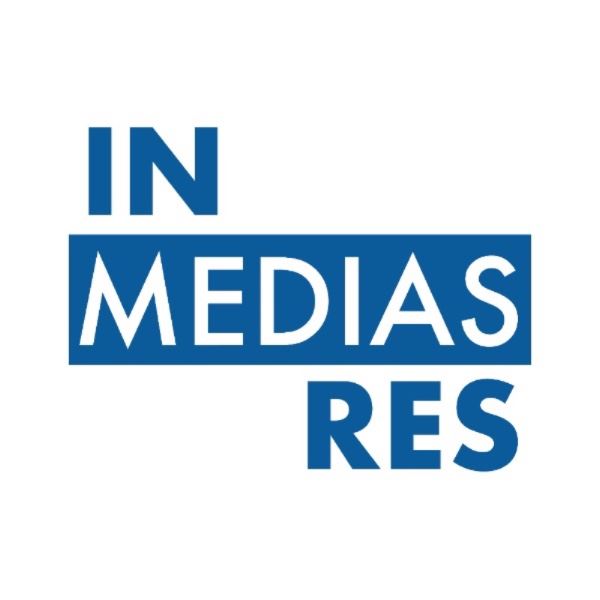

November 2020 Newsletter
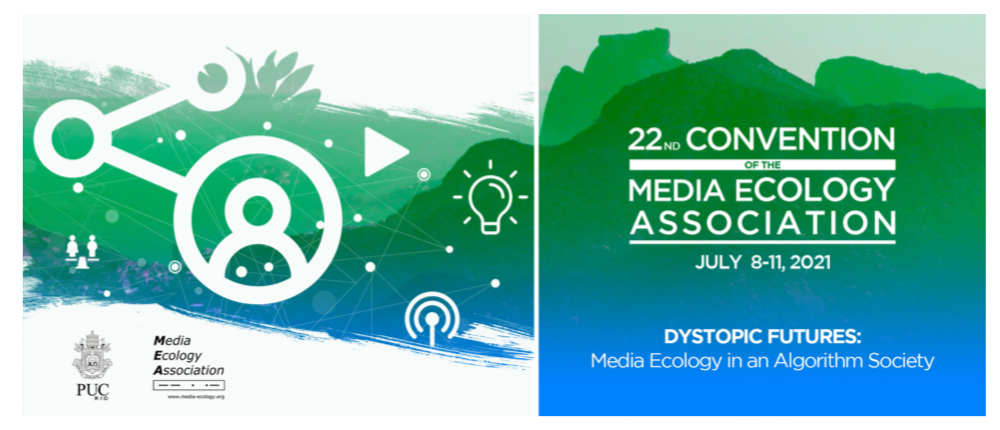
The Twenty-Second Annual Convention of the Media Ecology Association — Extended Call For Papers
THE MEDIA ECOLOGY ASSOCIATION (MEA) invites the submission of abstracts of papers and proposals for panels for presentation at its 22th Annual Convention, which will be held from 8 to 11 July, 2021 online, sponsored by Pontifical Catholic University of Rio de Janeiro, Brazil. The deadline for submission is 15 February 2021.
The MEA convention provides in its annual meeting an opportunity for the community of academics and professionals to exchange experiences and ideas in a friendly environment. MEA convention addresses a wide diversity of topics in thematic sections, panels and working groups. We encourage submissions that explore approaches from different fields of knowledge and social practices. We are interested in papers, thematic panels, roundtable discussion panels, creative projects, performance sessions, and other proposals of interest to media ecologists.
We also propose a single central theme to be explored throughout the conference with the aim of generating and exploring multiple perspectives. This is accomplished through plenary and special sessions. The central theme for 2021 focuses on Dystopic Futures. Not all submissions have to address the central theme.
THE THEME OF THE 2021 CONVENTION is Dystopic Futures: Media Ecology in an Algorithm Society. Dystopian societies are represented in a variety of science fiction works as an effort to predict pessimistic consequences of our current practices. Films, books and other forms of art set their narratives in the future, but not in our present culture. However, nowadays we are living in a sort of dystopic present with undesirable and frightening realities. In addition to our natural, environmental, political, ethical, cultural, health and social problems, we have to deal with issues brought by technological advances. We are living in a Technopoly (Postman, 1992), or in what some recent authors call Algorithmic Society, “a society organized around social and economic decision-making by algorithms, robots, and AI agents, who not only make decisions but also, in some cases, carry them out.” (Balkin 2016). What kind of dystopia can we envisage as consequence of our dystopic present?
General topics of interest related to the convention theme (but not limited to):
- Fake news, and social media: discursive breakdown and political consequences.
- Robots and transhumanism
- Algorithmic media: data mining, subjectivity modelling and decision-making
- Big Data, machine learning, AI, and society
- Limits of AI development: is it reasonable to talk about an AI take over?
- Movies and literature: mapping different kinds of dystopias.
- Pandemics, economical crash, irreversible climate changes and other disasters: what now?
- Any new (and better) world order on the horizon? Is not being dystopian nowadays possible?
- Media regulation is still at stake? In what sense and by what means?
- Discourse and education in the era of technology hegemony.
- Politics, Health, Citizenship, and Media
- Disinformation, censorship, and propaganda
- Crazy talk, Stupid talk in digital media
- Orality and digital literacy in a dystopic world
- Arts, technology, and cultural legacy
- Utopia, dystopia and Media Ecology studies
GUIDELINES FOR SUBMISSION
Please submit paper and panel proposals, in English, by 15 February, 2021 to MEA2021Convention@gmail.com. A maximum of two submissions per author will be accepted.
Authors who wish their papers to be considered for the Top Paper or Top Student Paper award must indicate this on their submission(s).
Submission Guidelines for paper and panel proposals:
- Include title(s), abstract(s) (maximum 250 words), and contact information for each participant.
- Outline, as relevant, how your paper or panel will fit with the convention theme.
- Authors with papers submitted as part of a panel proposal or as a paper proposal that wish to be considered for Top Paper or Top Student Paper must send the completed paper to the convention planner by May 15, 2021.
Submission guidelines for manuscripts eligible for MEA award submissions:
- Manuscripts should be 4,000–6,000 words (approximately 15 to 25 double-spaced pages)
- Include a cover page with your institutional affiliation and other contact information.
- Include an abstract (maximum 150 words).
INFORMATION
Please direct questions to Adriana Braga, MEA2021Convention@gmail.com. For more on the Media Ecology Association, visit https://www.media-ecology.org.
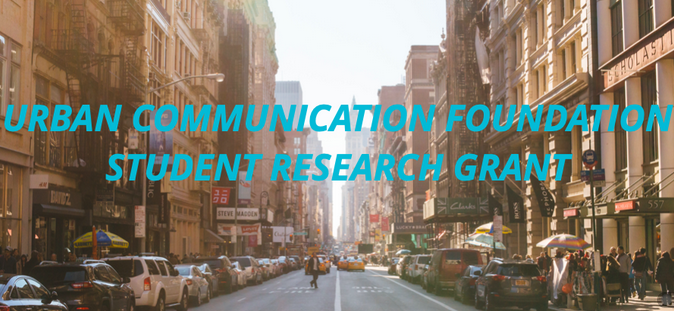
Urban Communication Foundation Student Research Grant
We are thrilled to announce this wonderful grant opportunity for graduate students of media ecology (due December 31):
Urban Communication Student Research Grant
The Media Ecology Association invites proposals for a research grant in the amount of $2500 sponsored by the Urban Communication Foundation. Proposals should be grounded in a theoretical or philosophical approach associated with the field of media ecology and should address topics of media ecological concern regarding the study of cities and urban environments as they relate to human communication, social interaction, technological mediation, and cultural change and continuity. Proposals concerned with identity and affiliation in relation to race, ethnicity, gender, religion, and other differences that make a difference are encouraged.
Proposals will be evaluated via anonymous review, and in addition to the stipend, the author(s) will receive complimentary membership in the Media Ecology Association (including subscription to Explorations in Media Ecology) for the year of the award and registration at our annual convention. A program session at the annual convention will be devoted to the research study, and when completed, the study will be published in Explorations in Media Ecology (which would not preclude publication elsewhere). The competition will be open to graduate students registered for degree programs and who have been Media Ecology Association members for at least one year.
For more information, visit: https://media-ecology.org/UCF-Grant/
MEA @ NCA 2020
The NCA convention was held online last weekend (11/19-11/22), and the MEA sponsored many wonderful panels! Take a look at the presentations and panels below.
The 2020 NCA convention theme, “Communication at the Crossroads,” suggests an emphasis on intra-disciplinary collaboration and exploration. Media ecology is situated to explore communication in this way as a metadiscipline that studies the ways in which human action shapes and is shaped by our media environments. The term “media” is broadly construed in the field and includes but is not limited to communication, technology, technique, orality and literacy, the arts, economics, education, ethics, etc. Thus, media ecology explores the conditions of human experience made possible by the complex patterns of interaction within and among our symbolic-material environments. These complex patterns of interaction represent a crossroads of sorts in an environment Neil Postman characterized by the phrase “information glut.”
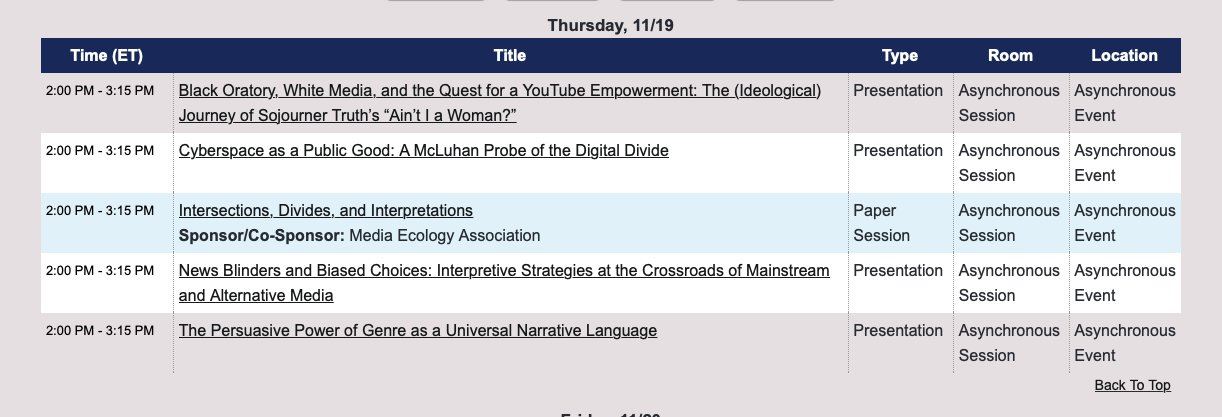
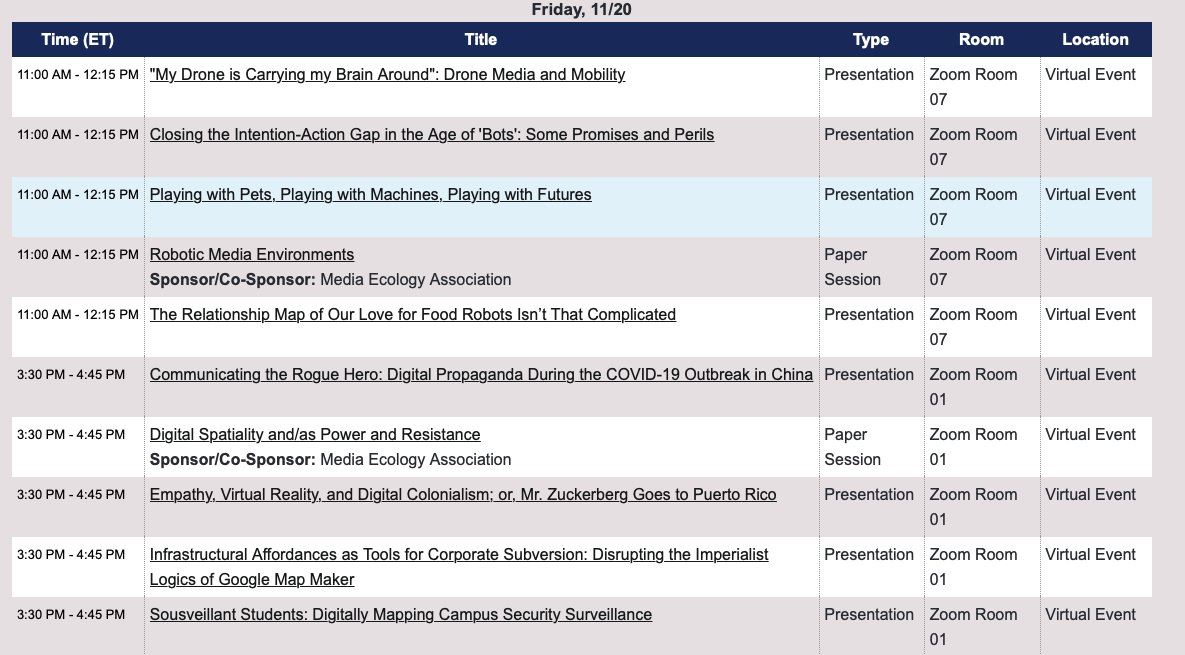
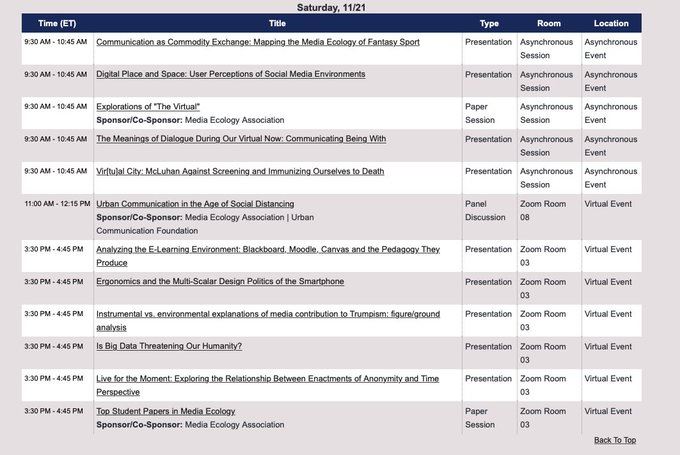
MEA @ NCA: Representations of MEA members in Top Paper Panels in other Divisions
Corey Anton and Carolin Aronis, separately, presented their work in the Philosophy of Communication Top Paper Panel. Anton, presented one of the chapters of his new book “How Non-Being Haunts Being,” “Non-Being in Language Structure, Content and Context.”
Aronis presented a paper that is forthcoming in the journal Cultural Studies, “Architectural Liminality as an Elemental Condition for Communication: The Case of Urban Balconies, Porches, Windows, etc.,” and which is part of her work-in-progress book manuscript on architectural media theory.
Aronis also presented a paper, “The ‘Tweeting’ Discourse of Balconies and Porches in the City: Identity Politics, Public Speaking and Social Change” in the Urban Communication Top Paper panel. Her paper is forthcoming as a chapter in The Urban Communication Reader IV.
Top Student Papers in Media Ecology
This panel celebrates the top student paper submissions to the Media Ecology division. The round of presentations discussed such issues as: online pedagogy, the political ergonomics of smartphones, the outsourcing of “free will” to external devices, a figure/ground analysis of Trumpism, and enactments of anonymity and the time perspective.
Chair: Mike Plugh, Manhattan College
Brad A. Haggadone, College of Media and Communication, Texas Tech University
J.D. Swerzenski, University of Massachusetts, Amherst
Gregory “Scott” McCown, Duquesne University
Andrey Miroshnichenko, York University
Cole Stratton, Indiana University
Gender and Media Ecology
PhD Student, Bernadette (bird) Bowen, organized a special panel on Gender and Media Ecology, that developed from a Graduate Seminar on Media Ecology that John Dowd taught last year in Bowling Green State University. The panel brought thought-provoking research in the intersection of Gender, Technologies, and Media Environments by young women scholars.
Chair: Carolin Aronis, University of Colorado, Boulder
Presenter(s):
- Bernadette Ann Bowen, Bowling Green State University
- Robin Hershkowitz: Bowling Green State University
- Emily Edwards, Bowling Green State University
Respondent: Michael Plugh, Manhattan College
Working Group for Increasing Inclusivity
Following a special workshop in the MEA convention, organized by Carolin Aronis (University of Colorado, Boulder), Peggy Cassidy (Adelphi University), Rachel Armamentos (Fordham University), and Bernadette Ann Bowen (Bowling Green State University)—sixteen MEA members volunteered to become new members of this group. Three of them stepped forward to lead the group. The new group members include board members, faculty, graduate and undergraduate students, all from different institutions and countries, and some are more new to the MEA while others are long standing members.
Multiple issues to strengthen MEA and the Media Ecology as a field of study were identified through the convention session (thank you for all contributors!). Currently, the three leaders are meeting the board member Carolin Aronis to create goals and objectives that will align with the vision of MEA.
MEA members who would like to volunteer, or provide any insight, please write to carolin.aronis@colostate.edu.

Call for Papers - EME’s 20th Anniversary
Call for Papers: Invited special issue in celebration of EME’s 20th anniversary.
Issue: 20:4
We welcome contributions that celebrate the 20th anniversary of the Explorations in Media Ecology: The official Journal of the Media Ecology Association. Contributions can come in the form of analyses, essays, poetry, art, reviews, etc. Possible topics welcomed in the issue, but not limited to: Past and future trends in the journal or media ecology Discussion of influential articles, poetry, art, reviews Inspirational authors of the MEA Traditions kept alive by the journal and ME.

Call for Submissions for Explorations in Media Ecology Vol. 19
All articles submitted should be original work and must not be under consideration by other publications.
Explorations in Media Ecology, the journal of the Media Ecology Association, accepts submissions that extend our understanding of media (defined in the broadest possible terms), that apply media ecological approaches and/or that advance media ecology as a field of inquiry.
As an interdisciplinary and multidisciplinary publication, EME welcomes contributions embracing diverse theoretical, philosophical and methodological approaches to the study of media and processes of mediation through language, symbols, codes, meaning and processes of signification, abstracting and perception; art, music, literature, aesthetics and poetics; form, pattern and method; materials, energy, information, technology and technique; mind, thought, emotion, consciousness, identity and behavior; groups, organizations, affiliations, communities; politics, economics, religion, science, education, business and the professions; societies and cultures; history and the future; contexts, situations, systems and environments; evolution and ecology; the human person, human affairs and the human condition; etc.
EME publishes peer-reviewed scholarly articles, essays, research reports, commentaries and critical examinations, and includes several special features. Our Pedagogy Section focuses on teaching strategies and resources, pedagogical concerns and issues relating to media ecology education; we are particularly interested in articles that share great ideas for teaching (GIFTs) media ecology in the classroom. The Probes Section features short items that are exploratory or provocative in nature. Creative writing on media ecological themes can be found in our Poetry Section. Questions and matters of concern to media ecology scholars are taken up in our Forum Section. And our Review Section includes individual book reviews and review essays.
EME is a refereed journal. Strict anonymity is accorded to both authors and referees. References and citations should follow the Harvard Referencing system, and the journal otherwise follows standard British English for spelling and punctuation.
Submissions can be uploaded online at: https://callisto.newgen.co/intellect/index.php/EME/submissions
Direct inquiries to
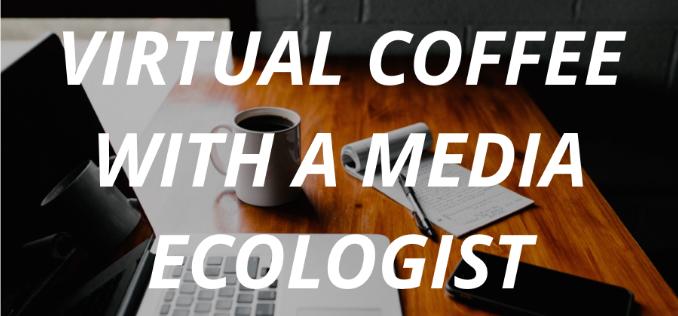
Virtual Coffee with a Media Ecologist
Are you interested in media ecology and have some questions about it? Are you working on a study related to media ecology and searching for advice? Are you an instructor looking for a media ecology expert to invite as a virtual guest speaker to one of your classes?
Get in touch with us! We are happy to schedule a “virtual coffee” appointment with you. Simply fill out the form below to set up a short call or virtual meeting with a scholar from the MEA.
The format is open to all. We especially encourage students and early-career scholars interested in media ecology to get in touch with us.
Do you have a background in media ecology and would like to volunteer for virtual coffee meetings with those looking to learn more about it? Send an email to Julia M. Hildebrand at hildebjm@eckerd.edu.
Arrange a Virtual Coffee appointment on our website.
MEA Member News and Achievements
New Book by Corey Anton, How Non-Being Haunts Being: On Possibilities, Morality, and Death Acceptance
Corey Anton is happy to announce the release of his latest book. Please try to get it into your local libraries.
How Non-Being Haunts Being: On Possibilities, Morality, and Death Acceptance, published by Fairleigh Dickinson University Press.
How Non-being Haunts Being reveals how the human world is not reducible to “what is.” Human life is an open expanse of “what was” and “what will be,” “what might be” and “what should be.” It is a world of desires, dreams, fictions, historical figures, planned events, spatial and temporal distances, in a word, absent presences and present absences.
Corey Anton draws upon and integrates thinkers such as Jean-Paul Sartre, Henri Bergson, Kenneth Burke, Terrence Deacon, Lynn Margulis, R. D. Laing, Gregory Bateson, Douglas Harding, and E. M. Cioran. He discloses the moral possibilities liberated through death acceptance by showing how living beings, who are of space not merely in it, are fundamentally on loan to themselves.
A heady multidisciplinary work, How Non-being Haunts Being explores how absence, incompleteness, and negation saturate life, language, thought, and culture. It details how meaning and moral agency depend upon forms of non-being, and it argues that death acceptance in no way inevitably slides into nihilism. Thoroughgoing death acceptance, in fact, opens opportunities for deeper levels of self-understanding and for greater compassion regarding our common fate. Sure to provoke thought and to stimulate much conversation, it offers countless insights into the human condition.
How Non-being Haunts Being makes much ado about nothing. A nimble scholar and graceful writer, Corey Anton explains why and how “human experience and reality as a whole can show itself for what it is only as we grasp how nothing or non-being relates to being.” Revelatory and provocative. Timely and important.
—Sheldon Solomon, Skidmore College
Table of Contents:
Preface
Chapter 1: Nothing at the Heart of Existence
Chapter 2: Life and Many Modes of Bodily Non-Being
Chapter 3: Language, Absence, Negation, and Context
Chapter 4: Death and the Possibilities of Human Morality
Chapter 5: A Mythological/Mathematical Postscript
You can order it from the publisher at https://rowman.com/ISBN/9781683932840/How-Non-being-Haunts-Being-On-Possibilities-Morality-and-Death-Acceptance and get a 30% off discount if you use this code: UP30AUTH21.
Anton presented three papers at NCA, all on parts of the book, which you can find here: https://www.youtube.com/watch?v=LEBKf4aWiNI
“Canadian Culture” Podcast
Musician, author, and educator Dr. Rea Beaumont has launched the podcast “Canadian Culture” that highlights the country’s diverse cultural heritage. The first episode features an interview with Andrew McLuhan, Director of the McLuhan Institute, discussing the groundbreaking work of Marshall McLuhan and Eric McLuhan.
http://www.canadianculturepodcast.com
CALL FOR NEWSLETTER CONTENT
To submit your news to In Medias Res, the official monthly newsletter of the Media Ecology Association, members can click here for the submission form.
We are looking for news that is relevant to the members of MEA. This might include member achievements (i.e., journal publications, books, creative works, etc.), awards received, upcoming relevant conferences, recent books that MEA members should be aware of, web content that might interest MEA members, news about upcoming EME issues, calls for submissions, etc.
The deadline for submissions to be included in the next month’s newsletter is the 28th of every month at 5pm EST.
Donate to MEA through AmazonSmile
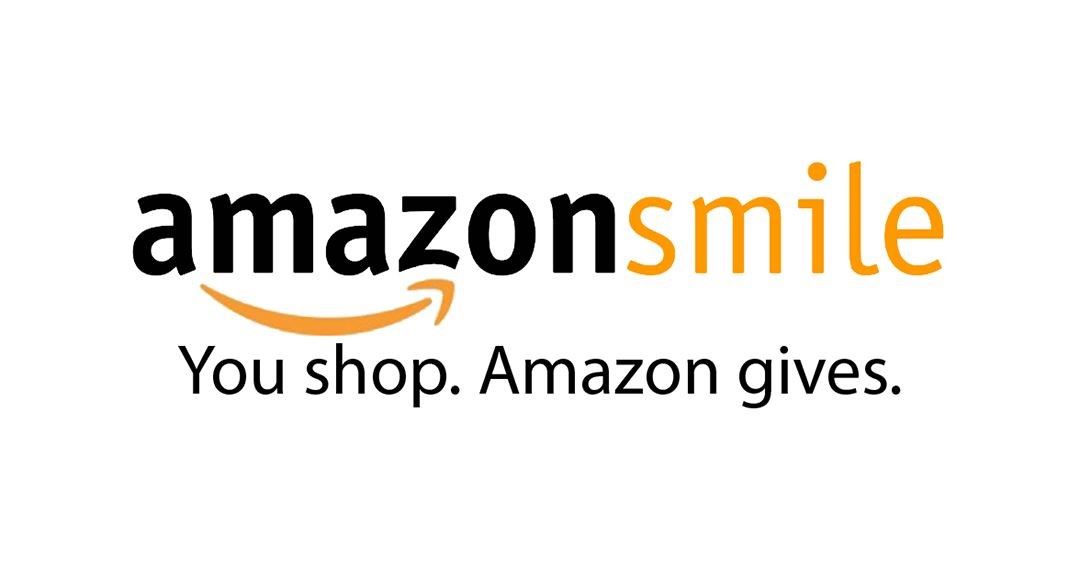
When you order through AmazonSmile, the AmazonSmile Foundation will donate 0.5% of the purchase price of eligible products to the charitable organization of your choice.”
To use it, go to smile.amazon.com and sign in as you usually do. Directly under the search bar, you will find a pull-down for supported charities. Search for and select Media Ecology Association.
